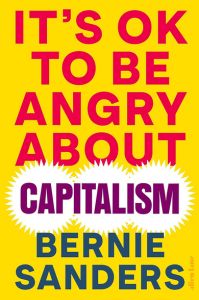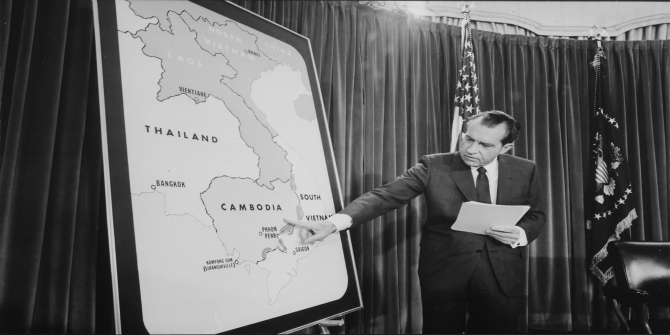
Michael Moore’s documentary Capitalism: A Love Story (2009) gave an account of the American experience of the 2008 Global Financial Crisis. Economic elites dispossessed working class families through predatory financing schemes.
When the plan backfired, they used the government to make the working class bail them out. Insult added to injury, followed by further injury. Many Americans became angry. The film introduced Bernard Sanders, a relatively unknown independent Senator for Vermont who understood capitalism as the source of their indignation. He called himself a “democratic socialist”. When asked what this meant, Mr Sanders explained:
[It] means that the function of government is to represent middle income and working people, rather than just the wealthy and the powerful. […] [W]e’ve become very religious in worshipping greed. […] We ignore [those] who every day are doing so much in improving the lives of people. We ought to change our value system.
In It’s OK to be Angry about Capitalism (2023), Sanders continues his moral argument about the need to change the value system of American politics and how to accomplish this
A decade and a half later, Sanders is better-known, having come dangerously close to the Democratic Party’s presidential nomination in both 2016 and 2020. In It’s OK to be Angry about Capitalism (2023), Sanders continues his moral argument about the need to change the value system of American politics and how to accomplish this. Two concepts resound throughout the book which underpin Sanders’ political thought and strategy: dignity and conscience.
Sanders discusses the perpetually intensifying degree of economic inequality in the US, and the efforts of those who combat it, through the language of dignity (9, 54, 76, 162, 164, 172, 210, 263). Dignity denotes moral value and worthiness of respect. We have human dignity because people inherently bear moral value. To treat people with dignity is to treat them accordingly.
Sanders writes: ‘The über-capitalist economic system … propelled by uncontrollable greed and contempt for human decency, is not merely unjust. It is grossly immoral’ (3)
Sanders writes: “The über-capitalist economic system … propelled by uncontrollable greed and contempt for human decency, is not merely unjust. It is grossly immoral” (3). This is because it enables colossal material gain by a handful of elites – the 0.001% of the American population who are billionaires and who acquired an additional $731 billion during the early months of the COVID pandemic (58) – at the expense of respect for the dignity of the majority, millions of whom died, or were left without health coverage during the same period (59).
With this consciousness, it sounds rather modest for Sanders to have proposed legislation to tax 60% of “the new wealth accumulated by billionaires during the pandemic”, and use that “$422 billion … to expand Medicare to cover all Americans during the crisis”. If passed, this would have partially mitigated the “absurd[ity] that the nation’s wealth was being redistributed upward at a time when everyone was supposed to be engaged in “shared sacrifice” (59). It is hard to dispute that the severity of economic inequality characterising what Sanders calls “über-capitalism” is an affront to human dignity and that at least the kinds of measures Sanders proposed should therefore be enacted.
[W]orkers want good wages, good benefits, and good working conditions. But I have also learned that working people want more—something most of them are not getting today. They want dignity. They want respect. They want a voice in the decision-making process (162).
The greed which entrenches and enflames workplace indignity extends to other spheres of life, and threatens life itself:
Unfettered capitalism will never accomplish the goal of bringing dignity to work. [I]t’s corporate greed and concentration of ownership and power, destroys anything that gets in the way of its pursuit of profits. It destroys the environment … our health … our democracy. It discards human beings without a second thought (164).
Sanders’ message is powerful: our dignity is not limited to freedom “from [governmental] authoritarian tyranny”, but demands also freedom in terms of “basic economic rights” (165).
If the end which politics should serve is human dignity, then appealing to it directly must be a decent strategy
When people and communities work together to fight for economic empowerment, they act in self-respect and mutual respect – upholding their individual and collective dignity. Sanders’ grassroots approach to campaigning holds that “Real change only comes from the bottom up, when thousands, then hundreds of thousands, and then millions stand together to demand a better deal” (154). If the end which politics should serve is human dignity, then appealing to it directly must be a decent strategy.
Being reminded of one’s own dignity might motivate an individual to fight for oneself. Another concept is needed to denote the capacity through which one can cultivate consciousness of, and concern for, the human dignity of others. That is conscience, embodied in Sander’s campaign slogan: Not me, us.
What Sanders calls “real politics” is conscience-driven politics with human dignity at its core:
Real politics […] understands that in the wealthiest country in the history of the world, we must reject the austerity economics that attacks the needs of working families in order to keep taxes low for the rich. It recognizes that we have the capacity to build a human society in which all people can live with security and dignity. [T]his is not utopian, pie-in-the-sky thinking. It is simply the conscious rejection of [a] system based on oppression and exploitation (262–263).
A truly collective political conscience is informed by consciousness of problems afflicting human dignity which characterise the existing class divisions in our societies. Sanders thinks this can be accomplished through grassroots campaigning which entails direct engagement with the people who bear the brunt of decisions the establishment makes about their lives (8–11, 22–26).
In ‘good conscience’ Sanders could not continue the 2020 campaign once the nomination became unwinnable (16). Sanders ‘appeal[ed] to the conscience of Americans’ in urging them to support Joe Biden against Donald Trump (46)
In “good conscience” Sanders could not continue the 2020 campaign once the nomination became unwinnable (16). Sanders “appeal[ed] to the conscience of Americans” in urging them to support Joe Biden against Donald Trump (46). Some progressives were disappointed. Yet his concern about the prospective human cost of a continued Trump presidency, including in relation to the pandemic, is well-articulated (44–49). Those who disagree with Sanders’ decision to fall behind Biden might still credit his campaign for engaging the consciences of millions to expand “political consciousness and [get] millions of Americans to embrace a new understanding of what they had a right to expect from their government” (18).
It’s OK to be Angry about Capitalism promotes a simultaneous goal and strategy: instilling moral values into politics. Sanders cannot, however, escape criticism. His argument focuses on “über-capitalism” and he only advocates “socialism” insofar as policy changes can accomplish supplementary forms of it. His agenda is about injecting doses of “socialist” policy into the capitalist order. He recounts when “America thrived” during the 1950s with such policies, for example a 92% top tax rate for the wealthiest Americans, under Republican president Dwight Eisenhower’s administration (121). This followed the Franklin Delano Roosevelt administration’s “tax on the windfalls of the wealthy to prevent profiteering during World War II”, which “was far more aggressive than anything proposed by contemporary law makers” including Sanders himself (120). As a result: ‘Working class Americans could afford to support themselves and buy homes on a single income. Inequality existed, but not like today” (121).
Sanders wants to make the minute group of economic elites treat the people with dignity through the same political system which he recognises those elites largely control.
Sanders claims a “political revolution” is so-called because it entails carrying out exigent economic changes through the existing American political system (54–55). Sanders wants to make the minute group of economic elites treat the people with dignity through the same political system which he recognises those elites largely control. Considerable power must therefore be taken from them to accomplish this – by breaking up monopolies, taxation of profits, and criminalising harmful conduct – Sanders argues, again, through said system (97–122, 274). (10–11, 31–36).
Sanders is a force for good, but does he play too nice? Should the next Sanders be more aggressive? Or does the Sanders-style ‘good cop’ movement need a parallel ‘bad cop’ to underscore the former’s magnanimity?
Sanders is a force for good, but does he play too nice? Should the next Sanders be more aggressive? Or does the Sanders-style ‘good cop’ movement need a parallel ‘bad cop’ to underscore the former’s magnanimity? Does the Democratic Party need to fall so that something better can rise from its ashes? Anyone concerned with the project of advancing human dignity within the US should read Sanders’ new book and then consider these important questions which remain to be determined.
- This review first appeared at LSE Review of Books.
- Image Credit: Pocket Canyon Photography on Shutterstock
- Please read our comments policy before commenting.
- Note: This article gives the views of the reviewer, and not the position of USAPP – American Politics and Policy, nor of the London School of Economics.
- Shortened URL for this post: https://bit.ly/40nGjWC







